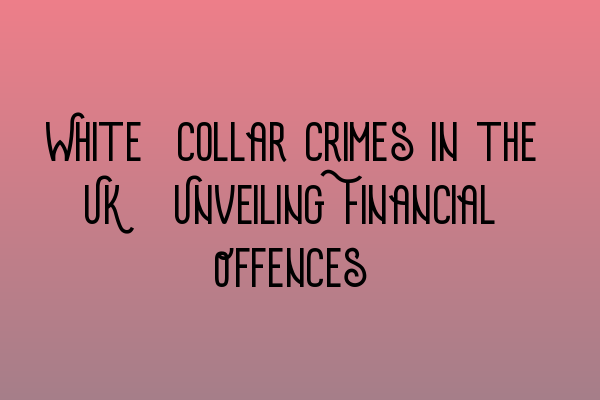White-Collar Crimes in the UK: Unveiling Financial Offences
White-collar crimes are a category of non-violent crimes typically committed by individuals in business or professional environments. These crimes involve deceit, manipulation, and fraud to gain illicit financial benefits. In the United Kingdom, financial offenses have gained significant attention due to their adverse impact on the economy and public trust. In this article, we will explore the various types of white-collar crimes prevalent in the UK and shed light on the legal implications and consequences associated with them.
Types of White-Collar Crimes
1. Fraud:
Fraud is perhaps the most common white-collar crime in the UK. It involves intentionally deceiving others for personal gain or causing financial loss to individuals or organizations. Examples of fraud include insurance fraud, tax evasion, and corporate fraud. To learn more about the legal aspects of fraud cases, visit our related article on SQE 1 Practice Exam Questions.
2. Money Laundering:
Money laundering is the process of making illegally-obtained money appear legitimate by disguising its true origins. This crime often involves complex financial transactions and sophisticated methods to conceal the unlawful proceeds. To enhance your understanding of money laundering offenses and legal frameworks, check out our article on SQE 1 Practice Mocks FLK1 FLK2.
3. Insider Trading:
Insider trading occurs when individuals with non-public information about a company use that information to trade stocks or securities, gaining an unfair advantage in the market. This practice is illegal as it undermines market integrity and fairness. If you’re interested in learning more about insider trading laws and regulations, browse through our comprehensive guide on SQE 2 Preparation Courses.
4. Bribery and Corruption:
Bribery and corruption involve the offering, giving, receiving, or soliciting of something of value to influence the actions or decisions of individuals in a position of power. These offenses undermine public trust, distort fair competition, and hinder economic development. Gain more insights into the laws and practices surrounding bribery and corruption by visiting our article on SQE 1 Preparation Courses.
Legal Implications and Consequences
White-collar crimes in the UK are taken seriously by law enforcement agencies and the judicial system. Convictions for such offenses can lead to severe penalties, including imprisonment, hefty fines, restitution, and damage to one’s reputation and career prospects. Stay up-to-date with the latest SRA SQE Exam Dates and make sure you are well-prepared for the legal profession.
Conclusion
White-collar crimes have a significant impact on the UK’s economy and cause harm to individuals and organizations. Understanding the various types of financial offenses, their legal implications, and consequences is crucial for legal professionals and individuals seeking justice. To ensure your success in the legal field, it is essential to stay informed, study diligently, and seek appropriate SQE-related resources and guidance.
For more information and resources regarding the SQE Criminal Law & Practice Law UK, feel free to browse through our website and explore the wide range of articles and courses available.
